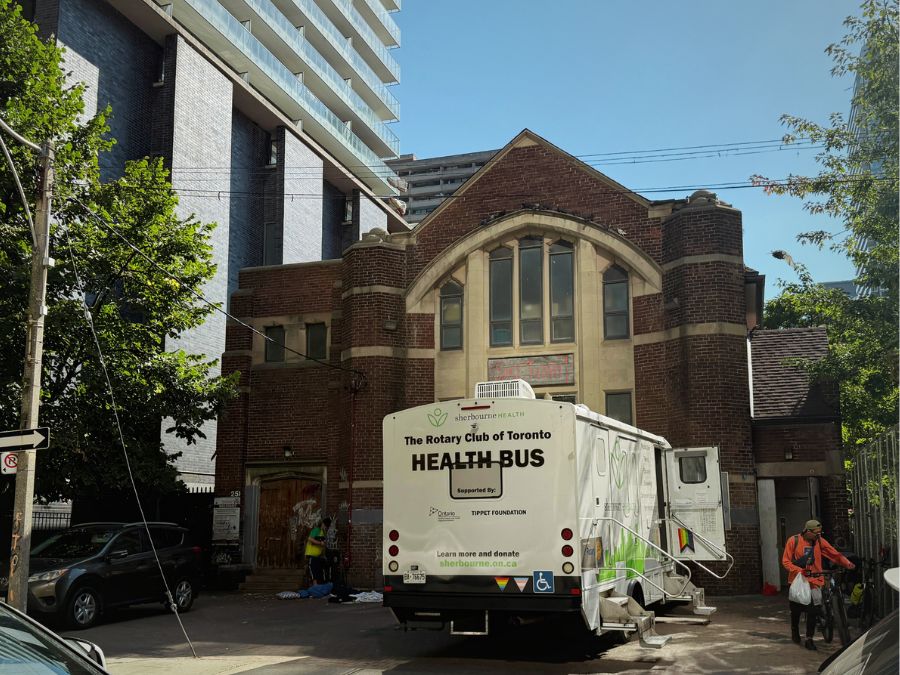Thirty-three years ago, a scrappy Christian R&B band decided Jesus probably had better things to do than linger at a church coffee house. They dreamed of carrying the good news into Toronto’s shelters, jails and streets. From that vision, Sanctuary Ministries was born. It was a place where the city’s poor and excluded could find a meal, a prayer and someone to remember their name.
Then rose the glass towers, Casa Condos among them, settling beside Sanctuary some 15 years ago. Today, those neighbours — or at least their board — have turned to the courts, seeking more than $2 million in damages.
You may unsubscribe from any of our newsletters at any time.
The board claims Sanctuary has permitted “illegal, illicit, disruptive, interfering and egregious conduct.” They describe the adjacent park as “overflow” for Sanctuary’s community — as if people without housing are somehow out of place in their own neighbourhood. The board president has even gone so far as to call Sanctuary a “cult.”
I know some of the people who have found home at Sanctuary. They also show up at my congregation’s Out of the Cold program. Many have shared their life stories with me, detailing abuse and neglect that makes my throat ache. Somehow, they’re still standing, still cracking jokes, still showing up. They’re not abstractions. They’re neighbours with names and histories. And without the care and consistency Sanctuary offers, some of them would be dead. Full stop.
I don’t know if the condo board understands this. If they do, I fear it might not matter. It wouldn’t be the first time someone’s comfort was weighed against another person’s survival and found heavier. A neighbour without a roof is tolerated about as much as dandelions in a manicured lawn.
The condo’s president insists Sanctuary is “in the business of helping enable homeless drug addicts,” and that residents are now too scared to walk their own street. They say this isn’t just about property, but about safety.
It’s an important question: who deserves safety? The residents who can lock a door at night, or the ones who curl up on a bench outside with the cold seeping in through their shoes?
Both, of course.
More on Broadview:
- Brampton threatens legal action against church supporting vulnerable residents
- Filmmaker captures untold stories of Black caregivers in Canada
- Canada is losing its churches. Can communities afford to let that happen?
But it’s dishonest to pretend the risks are equal. It’s the most obvious math in the world. When you have a home, you are far less likely to be beaten, robbed, raped or killed than the person trying to sleep on the sidewalk beneath your window.
Condo residents aren’t wrong to want safety. But neither is Sanctuary’s community. It’s a failure of the government if safety hasn’t been secured for both.
And yet, in the condo’s version of responsibility, the problem isn’t the decades of neglect, the poisoned drug supply or the housing crisis that has left thousands without a place to land. The problem, somehow, is the community and staff at Sanctuary. It’s like blaming the first-aid tent for the war.
But the people who make up Sanctuary are not invaders. Many have been part of the neighbourhood for decades. They belong as surely as the professionals who now make their homes high above Charles Street.
If Sanctuary were pushed out, the people it cares for wouldn’t simply vanish. The lawsuit might shuffle bodies from one block to the next, but it will not cure hunger or the cold.
This is the story of gentrification; each new build pushes property values higher while making it harder for the poor to endure. Toronto desperately needs more housing — and more density too. But when those units are built, bought and sold (often simply as investments) without regard for those least able to benefit, “progress” for some becomes exile for others.
Scripture has seen this pattern before. The prophet Isaiah warns, “Woe to those who add house to house and join field to field until there is no room left for the poor in the land.” Despite what the Casa Condos board claims, the sin here is a city that keeps building higher and higher while leaving its most vulnerable to sleep in the shadows below.
To sue Sanctuary is deeply misguided. And cruel. The real scandal isn’t what happens on Sanctuary’s steps or in the park; it’s that Toronto still needs Sanctuary at all.
***
Rev. Bri-anne Swan is the minister at East End United Regional Ministry in Toronto.















Well said Bri-Anne. Do the haves ever put themselves in the shoes of the have nots I wonder. . We never know what the future holds.
For someone who has a heart for the homeless, this piece is spot on. Thank you to the writer and to Sanctuary. Long may your fire burn!
Sanctuary is refuge for some but the biggest issue is drugs. These are not homeless people. Most are drug dealers. With all of this press they have moved out of the “church” and into George hislop park making it unusable. It is not safe. We live on the street and have watched the erosion. Try living next door drug dealers. This has ruined several small businesses on the street. Doing nothing and letting these people take over the park is not fair to anyone. I know many will be angry to read this but come visit and then as if you would like a this in your neighborhood
I think those having to encamp in the park because they are unhoused, and not drug users could have much to tell yourself about “living next door to drug dealers”; and those that do use drugs should not be blamed for suffering much more than you for “living next door to drug dealers”. It is a lot harder when next door means a piece of waterproof tarp v. brick walls you potentially own.
I would love to see your evidence for “Sanctuary is a refuge for some but the biggest issue is drugs. These are not homeless people. Most are drug dealers.”
By the way, I DO live near you and own a condo in a building, and I would never ever consider blaming those who don’t have v. those who have in a society we implicitly accept as hierarchical and competitive, even though I likely “watch” the same things you do, but with sadness and anger in my heart for how unjust it is.
How about you try to suffer as someone without housing/ an addiction/ barely any systemic support, and constant judgement from people like yourself who dare to compare suffering with inconvenience.
The situation is fair. You are expressing that somehow you deserve security, space, a home and others do not. Therefore, accept others do not by the system get what you have. It has nothing to do with merit. They system you accepts determines it.
I am angry at your statements, but I live in your neighbourhood and do not have to come “observe” as though you can understand based on that- I experience the same thing but am not whining. In fact your perspective disgusts me.
lol, actual drug dealers do not live in tents. Why would they take the risk with the law to get the practically nothing your neighbours, who should be empathized with, are getting.
Drug dealers have money- that is why they do it. They have cars for one, so they can distribute drugs, and homes from the money they make.
If people living next to you in tents are selling drugs at any time, it is to support their own addiction, which is EXTREMELY difficult to overcome when you also have major life instability and little future to reliably look toward (e.g., living in an encampment because you have no other options).
I shouldn’t have to explain this to another “human being”. It makes me extremely angry and depressed to see such pitiful expressions of humanity from people who have so much more materially, but so little heart, and I wonder what the worth of people like YOU is in society. However, attack your home? no.
(just to make clear since you appear to be quite a whiner)
Bri-Anne said it well! Frankly, isn’t it beholden to the owners of the condos to have checked out the surrounding neighbourhood before signing on the dotted line to buy? Perhaps the Casa Condo Board would be better to sue the developer or realtor who sold them the condo without presenting them with all the “facts” ??? An interesting legal question…
The analogy of a first aid tent in war is very apt. The “first aid” tent was there before Casa Condos so I can’t imagine a successful outcome for the condo owners. Imagine if they took their legal money and time and offered it to Sanctuary, how further ahead everyone would be.
Thank you for a sensible, heart-warming perspective.
Bri-Anne, your Isaiah quotation is so apt in this situation. I have many fond memories from visiting Sanctuary to deliver donations or to have a meal or to play bridge with the cook. I remember when that condo went up. I think the Wellesley Institute got displaced by development on that street.
Brianne, did you spend time on this street before writing this piece? As someone who has lived here over a decade, I can assure you these are not the same homeless people you describe above. I have lost count of how many violent encounters and drug deals I have seen in broad daylight outside the church and not one staff member is ever in sight. Side-stepping human feces and needles on the sidewalks has become the norm. I was well aware of the Sanctuary before moving to this street and had no issues whatsoever with its presence in the neighbourhood up until recent years. Residents of this street know how many attempts have been made by the condo board to work with the Sanctuary to make the neighbourhood safer for everyone but they don’t take any responsibility for what is happening right on their property day after day. This lawsuit is not some whim, it is the result of years of trying and getting nowhere. I wish someone would really delve into this instead of just assuming what is happening on the surface and just labelling it gentrification or NIMBY.
It’s not an assumption but based on decades of academic research and observation of historical patterns occurring in many societies. What is happening is not due to the failure of individuals.
It is clear to me that your ability to get out of marginalization, which systemically works to keep the “have-nots” there so others can be the “haves”, in a society we all implicit accept as unequal, whether by merit, power or any justification, has led you to justify yourself. My “observation” shows this is common in formally-disadvantaged people who need to feel they are responsible for moving up social-classes, despite objective evidence that it is a common symptom of the same hierarchical system all live under.
People are not labelling this because it is not a special situation, just extreme. Do some research and look at decades of evidence predicting this behaviour, and your reaction as well.
I bet the more you label the clients at Sanctuary “shit-heads” completely to blame for behaviour PERCEIVED AS upsetting to people with way more supports and resources, the better you feel about yourself now, right?
All human beings have the capacity to behave in ways they want to and are in control of, or not, based on their environment. You are no different, and neither are the people who rely on Sanctuary.